Key takeaways:
- Pro-life advocacy emphasizes the inherent value of every human life and the importance of supporting individuals facing difficult circumstances.
- Social justice and pro-life ideals intersect, highlighting the necessity to address inequalities and promote fair treatment for all, regardless of background.
- Effective advocacy involves building connections, sharing personal stories, and leveraging social media to inspire community engagement and change.
- Activism empowers individuals through shared experiences and collaborative efforts, fostering growth and solidarity within the community.
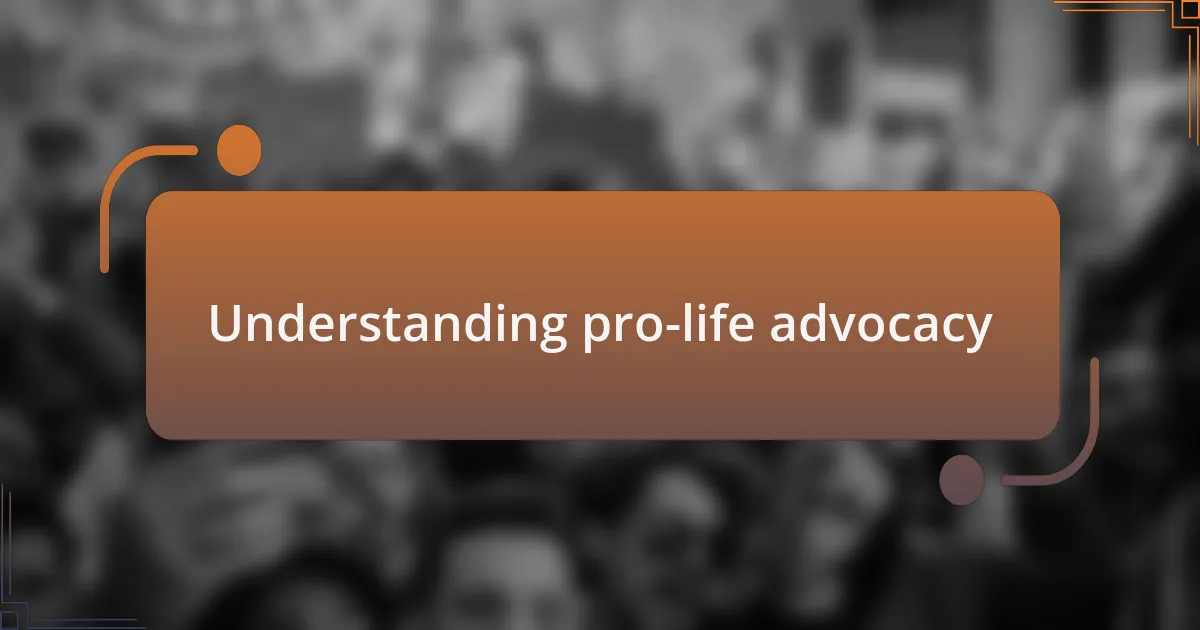
Understanding pro-life advocacy
Pro-life advocacy is centered around the belief that every human life, from conception to natural death, possesses inherent value. When I first started engaging in these discussions, I was struck by how deeply personal the topic is for so many people. Have you ever really thought about what the beginning of life looks like?
Many pro-life advocates share poignant stories—like meeting a young mother who bravely chose to keep her child despite overwhelming odds. In that moment, it became clear that pro-life advocacy isn’t just about opposing abortion; it’s about supporting the individuals involved, ensuring they have access to resources and community support. This personal connection to others’ narratives often fuels my passion for this cause.
As I reflect on my experiences, I can’t help but wonder how our society could transform if we collectively embraced the value of every life. It’s not just about legislation; it’s also about creating a culture that nurtures and uplifts, advocating for the vulnerable, and recognizing that dignity starts from the very beginning.
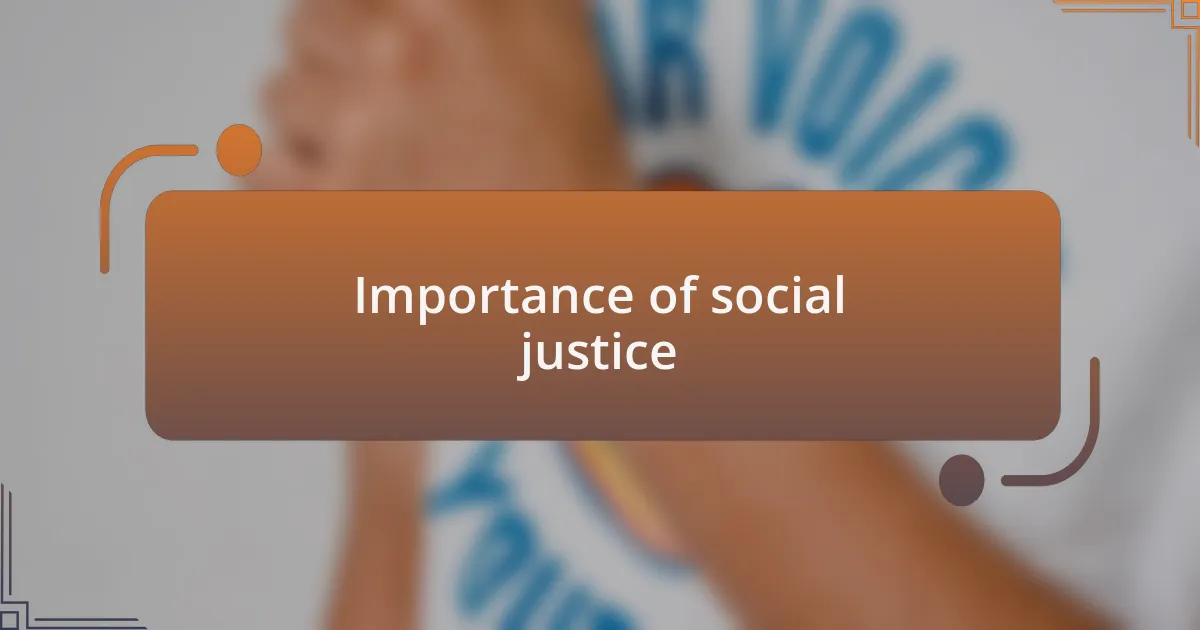
Importance of social justice
Social justice is not just a lofty ideal; it’s an essential foundation for a just society that values every life. I remember attending a rally where a speaker shared how systemic inequalities had affected her family’s access to healthcare. It hit me hard, reminding me that in advocating for life, we also need to address the barriers that prevent equality and fair treatment for everyone. Wouldn’t it be a powerful statement if we could advocate for both the unborn and those struggling for their basic rights?
As I engage with my community, I’ve come to realize that advocating for social justice often overlaps with pro-life ideals. Working with local organizations, I’ve seen firsthand how assisting struggling families not only uplifts their voices but also creates a ripple effect of hope and change. When you offer support to someone in need, it reinforces the belief that every life matters, and that sentiment fosters deeper understanding across different societal issues.
The conversation around social justice also challenges us to confront uncomfortable truths about our society. Have I ever paused to consider how my privilege shapes the conversations I have? We need to ensure that the dialogues we engage in are inclusive and empathetic, acknowledging that everyone’s experience contributes to the tapestry of our shared humanity. It’s in these moments of reflection that I find my own advocacy becomes richer, not just in promoting life, but in fostering justice for all.
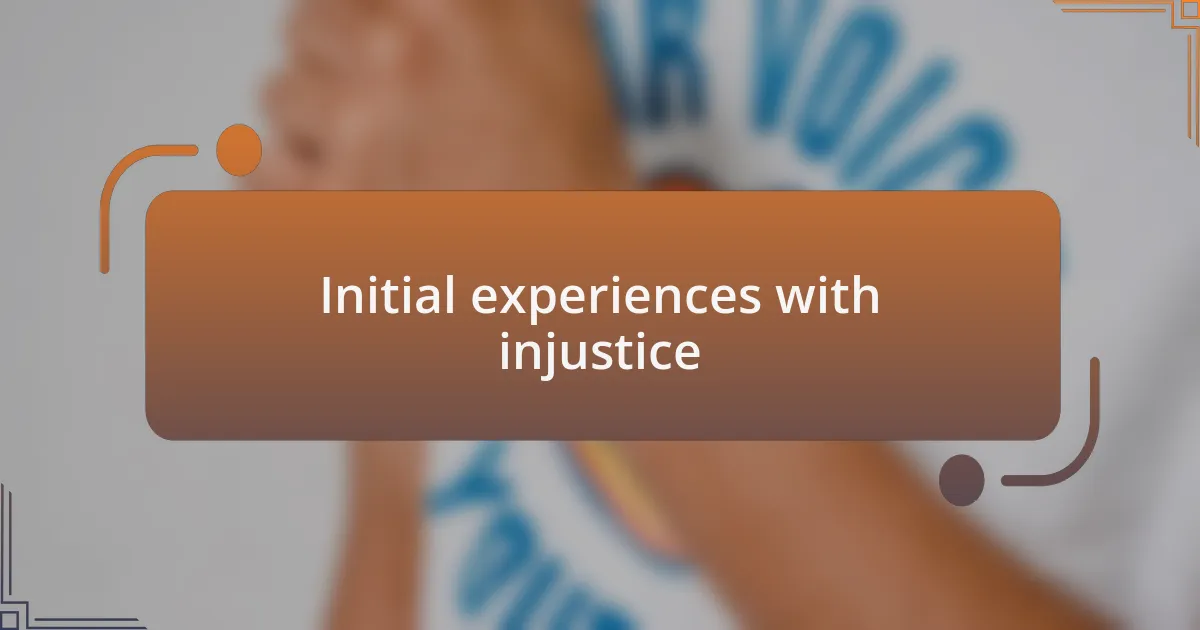
Initial experiences with injustice
My first brush with injustice happened during a volunteer event at a local crisis pregnancy center. I met a young woman who was navigating an unplanned pregnancy while battling financial instability. Listening to her share her struggles made me acutely aware of how societal structures often fail the most vulnerable. I couldn’t help but wonder, how many more stories like hers go unheard?
Another pivotal moment for me occurred when I witnessed the disparity in support for families in different neighborhoods. I visited a community where parents struggled to access basic resources like childcare and healthcare, while across town, others had abundant support systems in place. It was frustrating to see how location could dictate the level of care and opportunities available. Doesn’t everyone deserve a fair chance at happiness, regardless of where they live?
These experiences ignited a fire within me to confront these injustices head-on. Reflecting on my own journey, I realized that understanding the complexities of these issues isn’t just an intellectual exercise; it’s a call to action. It makes me consider how my own background influences my perceptions and drives me to ensure that my advocacy is rooted in empathy and awareness of others’ realities.
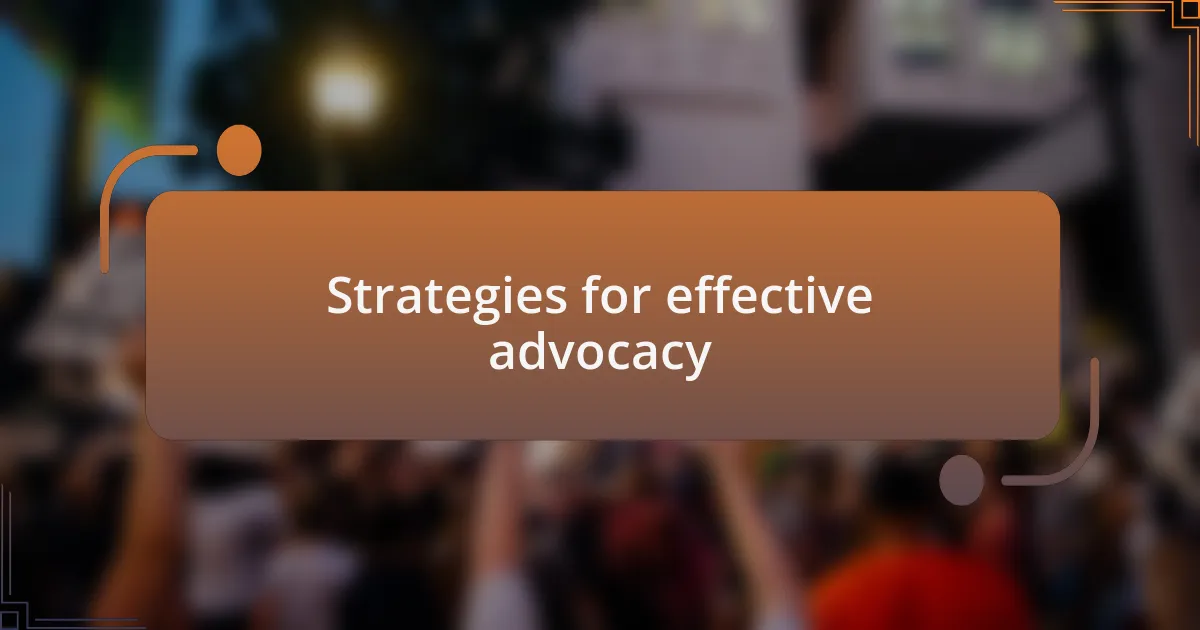
Strategies for effective advocacy
To advocate effectively, it’s crucial to build genuine connections with those you aim to support. I remember attending a town hall meeting with a group of mothers advocating for better mental health resources in schools. When I listened to their heartfelt stories about their children’s struggles, I felt a deeper understanding of their needs. It became clear to me that advocacy isn’t just about shouting from the rooftops; it’s about amplifying the voices of individuals who deserve to be heard.
Another fundamental strategy is to be informed and articulate about the issues at hand. During a workshop I attended on pro-life issues, I learned how statistics and real-life stories combine to create a powerful narrative. I noticed how presenting data alongside personal experiences helped shift perspectives, making people more receptive to our message. Isn’t it interesting how facts and feelings can work together to foster understanding and connection?
Moreover, leveraging social media can elevate your advocacy efforts exponentially. I decided to share my journey and insights online, and the feedback was overwhelming. I was surprised to find that my posts sparked conversations that led to tangible change in my community. Have you ever thought about how your own story could inspire others to join the fight?

Building a supportive community
Building a supportive community starts with establishing trust among its members. I still remember the first small group discussion I attended at a local church. Sharing our experiences, we quickly realized that despite our different backgrounds, we were all connected by similar values and concerns. This genuine sharing created a safe space, which fostered not just camaraderie, but a solid foundation for collective action.
Engagement is another key element in nurturing a community. I’ve seen how hosting regular meetups can draw people in. Just last month, we organized a picnic where families could bring their children and discuss pro-life advocacy in a relaxed environment. It was such a joy to witness relationships blossoming as families united for a common cause. Doesn’t it make you wonder how a simple gathering can transform strangers into friends and allies?
Furthermore, active listening plays a vital role in cultivating support. In a recent women’s retreat, I sat down with others to share our challenges and triumphs in advocacy. The act of truly hearing one another’s stories made everyone feel valued and empowered to contribute. Have you noticed how encouraging dialogue creates not just understanding but also motivation to stand together in the face of injustices?
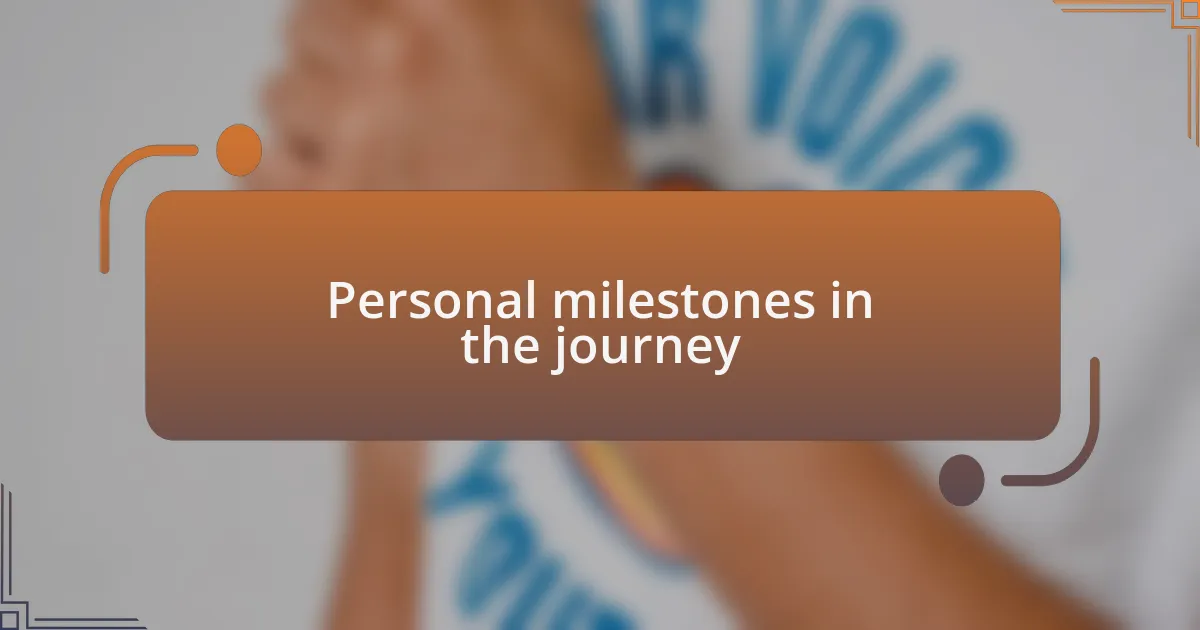
Personal milestones in the journey
One of my proudest milestones came when I organized my first local awareness campaign. Standing in front of a group, nervously clutching my notes, I began sharing our message about the importance of life. The applause I received felt like more than just approval; it was a powerful affirmation that I was on the right path. Can you recall a moment when you realized your voice had the power to inspire others?
A few months later, I held my first workshop aimed at educating young people about the pro-life movement. I vividly remember the animated conversations that erupted as participants engaged with the material. Watching their faces light up with understanding affirmed my belief in empowering the next generation. Wasn’t it invigorating to see how knowledge could spark passion and action in others?
A significant turning point in my journey was when I shared my personal story at a state conference. Opening up to a large audience about my experiences made the cause feel more personal and vulnerable. In that moment, I learned how sharing our struggles not only humanizes the issue but also strengthens our resolve. Have you ever found that being open about your experiences created unexpected connections?
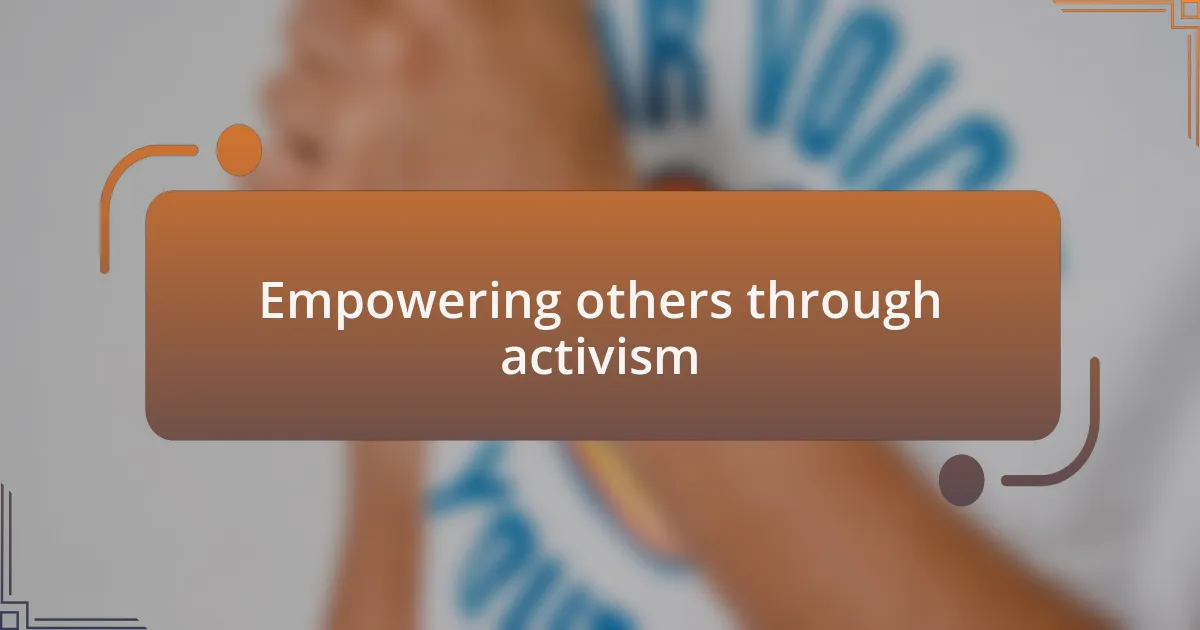
Empowering others through activism
Activism can be a catalyst for change, not just for the cause, but for those involved. I remember attending a small gathering where someone shared their own journey with unexpected pregnancy. Their openness ignited a sense of solidarity in the room, encouraging others to voice their stories, which reminded me how deeply shared experiences can empower individuals. Have you ever felt the sheer strength that comes from connecting through vulnerability?
Leading a team of volunteers was another eye-opening experience for me. Over time, I noticed how each person blossomed as they took on responsibilities in our campaigns. One volunteer, who once hesitated to speak up, later delivered a powerful speech that resonated with many. It made me reflect: how often do we underestimate the potential within others? Witnessing their growth became a powerful reminder that empowering those around us creates a ripple effect in the community.
Furthermore, I’ve learned that activism is most impactful when we rally together to amplify each other’s voices. For instance, collaborating with organizations that focus on supporting mothers in crisis has been incredibly rewarding. Seeing the relief in their eyes when they realize they’re not alone fuels my passion. What could be more motivating than knowing that our joint efforts can transform lives?